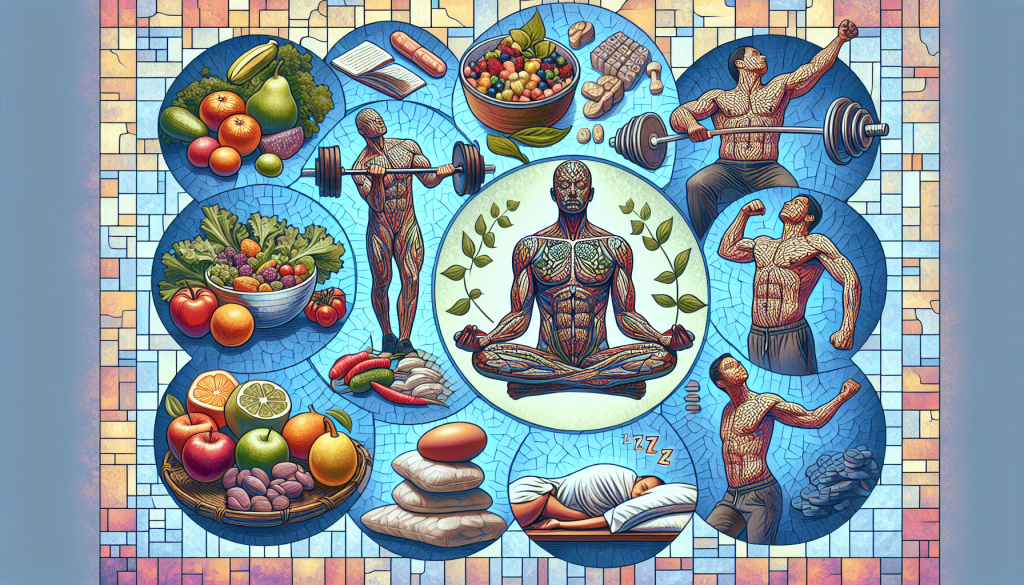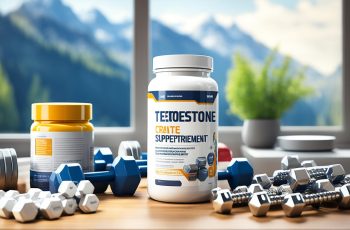Ad Blocker Detected
Our website is made possible by displaying online advertisements to our visitors. Please consider supporting us by disabling your ad blocker.
If you’re looking for ways to naturally increase your testosterone levels, you’re in the right place! In this article, we’ll share some valuable tips that can help you boost your testosterone levels without resorting to medications or supplements. So, if you’ve been wondering how to raise your testosterone level, keep reading to discover some simple and effective methods that can make a big difference in your overall health and well-being.

This image is property of images.unsplash.com.
Exercise regularly
Regular exercise is a key component in maintaining overall health, and it can also have a positive impact on testosterone levels. Engaging in strength training exercises is particularly beneficial. By challenging your muscles with weights or resistance bands, you stimulate the production of testosterone. Focus on compound exercises that target multiple muscle groups, such as squats, deadlifts, and bench presses. These exercises require more effort and energy, resulting in a greater release of testosterone.
High-intensity interval training (HIIT) is another effective exercise method for boosting testosterone. HIIT involves alternating between periods of intense exercise and short recovery periods. This type of training has been shown to increase testosterone levels and improve overall fitness. Incorporating HIIT sessions into your exercise routine a few times a week can yield great results.
In addition to strength training and HIIT, burst training is a technique that can elevate testosterone levels. Burst training involves short bursts of intense activity, followed by periods of rest or lighter activity. This type of training is believed to stimulate the release of testosterone. Sprints, plyometric exercises, or even jumping jacks can be incorporated into a burst training session.
While exercise is important for testosterone production, it’s crucial to avoid overtraining. Excessive exercise can actually have a negative impact on testosterone levels. It’s important to listen to your body and give yourself enough time to rest and recover between workouts. Aim for a balanced exercise routine that includes both strength training and cardiovascular exercises, and be mindful of your body’s limits.
Maintain a balanced diet
Your diet plays a significant role in hormone regulation, including testosterone production. In order to naturally increase testosterone, it’s important to consume a balanced and nutritious diet. Healthy fats are particularly beneficial for hormone production. Include foods such as avocados, olive oil, nuts, and seeds in your diet. These healthy fats provide the building blocks for testosterone production.
High-quality proteins are also crucial for maintaining optimal testosterone levels. Include lean sources of protein in your meals, such as chicken, fish, eggs, and legumes. These foods provide essential amino acids that support the production of hormones.
Vegetables are not only rich in vitamins and minerals but also contain compounds that can help optimize testosterone levels. Aim to include a variety of vegetables in your diet, such as broccoli, spinach, kale, and cauliflower. These vegetables contain nutrients that support the production and utilization of testosterone.
Fiber is an important component of a healthy diet and can help regulate hormone levels. Whole grains, fruits, and vegetables are excellent sources of dietary fiber and should be prioritized in your meals.
On the other hand, it’s important to limit your intake of sugar and processed foods. These foods can disrupt hormone balance, including testosterone production. Replace sugary snacks and processed meals with healthier alternatives, such as fresh fruits, nuts, and homemade meals.

This image is property of images.unsplash.com.
Manage stress levels
Chronic stress can have a negative impact on testosterone levels. Therefore, it’s important to find ways to manage and reduce stress in your life. Practice relaxation techniques, such as deep breathing exercises, meditation, or yoga. These activities can help activate the body’s relaxation response and reduce stress hormone levels.
Getting enough sleep is also crucial for maintaining healthy testosterone levels. Aim for seven to nine hours of quality sleep each night. Create a bedtime routine that promotes relaxation, such as avoiding screens before bed and creating a calming sleep environment.
Engaging in stress-reducing activities can also have a positive impact on testosterone production. Find activities that you enjoy and that help you unwind, such as listening to music, going for a walk in nature, or practicing a hobby. These activities can help reduce stress and promote overall well-being.
Consider incorporating adaptogenic herbs or supplements into your routine. Adaptogens are herbs or compounds that can help the body adapt to stress and regulate hormone levels. Popular adaptogens for testosterone support include ashwagandha, maca root, and ginseng. Consult with a healthcare professional before starting any new supplements.
If you find that stress is significantly impacting your mental health and overall well-being, consider seeking therapy or counseling. Talking to a professional can provide valuable support and guidance in managing stress and improving hormone balance.
Optimize vitamin and mineral intake
Certain vitamins and minerals are vital for testosterone production and overall hormonal health. Make sure to include these nutrients in your diet to support optimal testosterone levels.
Vitamin D is essential for testosterone production, and low levels of vitamin D have been linked to low testosterone. Ensure sufficient vitamin D intake by spending time outdoors, particularly in the early morning or late afternoon when the sun’s rays are less intense. Exposing your skin to sunlight without sunscreen for about 15 minutes a day can help boost vitamin D levels. If you live in an area with limited sunlight or have low vitamin D levels, consider taking a vitamin D supplement.
Zinc is another important mineral for testosterone production. Include zinc-rich foods in your diet, such as oysters, shellfish, lean meats, and legumes. If you have difficulties meeting your zinc requirements through diet alone, zinc supplements can be considered. However, it’s important not to exceed the recommended dosage as excessive zinc intake can have negative effects.
Magnesium is a mineral that supports testosterone production and can help with sleep quality and stress management. Include magnesium-rich foods in your diet, such as dark leafy greens, nuts, seeds, and whole grains. Magnesium supplements may also be beneficial for those with suboptimal magnesium levels.
Vitamins B6 and B12 are involved in hormone regulation and can support healthy testosterone levels. Include foods rich in these vitamins, such as fish, poultry, eggs, and leafy greens, in your diet.
Ashwagandha, an adaptogenic herb, has also shown promising results in supporting testosterone levels. Consider taking ashwagandha supplements after consulting with a healthcare professional.

This image is property of images.unsplash.com.
Maintain a healthy weight
Maintaining a healthy weight is important for overall health, including testosterone production. Excess body fat, particularly around the waistline, can contribute to hormonal imbalances. Therefore, losing excess body fat through a combination of a balanced diet and regular exercise can help optimize testosterone levels.
It’s important to avoid yo-yo dieting or extreme dietary approaches, as these can have negative effects on testosterone levels. Instead, focus on following a balanced and sustainable eating plan that includes all the essential nutrients.
Monitor your calorie intake to ensure you are consuming an appropriate amount for your activity level and goals. Consuming too few or too many calories can affect hormone balance. Aim to strike a balance and fuel your body with the nutrients it needs.
Staying physically active is crucial for maintaining a healthy weight and supporting hormonal balance. Incorporate both cardiovascular exercises and strength training into your routine to optimize testosterone levels.
Reduce alcohol consumption
Excessive alcohol consumption can negatively impact testosterone levels. It’s important to limit your alcohol intake and avoid heavy drinking. Heavy or chronic alcohol use can disrupt hormone production and lead to imbalances.
Opt for low-alcohol drinks when you do choose to indulge. Certain alcoholic beverages, such as beer, contain compounds that can affect testosterone levels. Moderation is key when it comes to alcohol consumption, especially if you are looking to optimize testosterone levels.
Taking breaks from alcohol is also beneficial for overall health and hormone balance. Consider incorporating alcohol-free days or weeks into your routine to give your body a chance to recover and regulate its hormone production. Additionally, drinking plenty of water can help support overall health and prevent dehydration.

Get enough sunlight exposure
Sufficient sunlight exposure is important for maintaining optimal vitamin D levels, which, as mentioned earlier, is crucial for testosterone production. Make it a habit to spend time outdoors, particularly during the early morning or late afternoon when the sun is less intense.
To maximize vitamin D synthesis, expose your skin to sunlight without sunscreen for about 15 minutes a day. It’s important, however, to avoid excessive sun exposure, which can lead to skin damage and increase the risk of skin cancer. Follow safe sun protection practices, such as wearing protective clothing and applying sunscreen with at least SPF 30 when spending longer periods of time in the sun.
If you live in an area with limited sunlight or have difficulty maintaining adequate vitamin D levels, consider taking a vitamin D supplement. Consult with a healthcare professional to determine the appropriate dosage for your needs.
Practice intermittent fasting
Intermittent fasting is a dietary approach that has gained popularity in recent years for its potential health benefits, including the optimization of hormone levels. There are different methods of intermittent fasting, and it’s important to find the one that works best for you.
Time-restricted eating is a popular form of intermittent fasting that involves limiting your eating window to a specific number of hours each day. This typically means fasting for 16 to 20 hours and eating within a 4 to 8-hour window. By giving your body a break from constant food intake, it can help regulate hormone levels, including testosterone.
Alternate day fasting is another approach where you eat normally on certain days and significantly reduce your calorie intake or fast on alternate days. This method requires careful planning and monitoring to ensure that you are getting enough nutrients on non-fasting days.
Periodic prolonged fasting involves longer fasting periods, ranging from 24 hours to several days. This method should only be done under the guidance of a healthcare professional, as it can have potential risks and requires careful monitoring.
During eating windows, it’s important to ensure proper nutrition by consuming a balanced diet that provides all the necessary nutrients. Focus on including lean proteins, healthy fats, and a variety of fruits and vegetables.
Avoid endocrine-disrupting chemicals
Certain chemicals found in our environment can disrupt hormone balance, including testosterone production. To minimize exposure to these endocrine-disrupting chemicals, consider the following:
Choose organic or hormone-free foods whenever possible. Organic foods are grown without the use of synthetic pesticides and fertilizers, reducing your exposure to potentially harmful chemicals. Similarly, hormone-free animal products help to avoid the consumption of added hormones that could disrupt your own hormone balance.
Minimize exposure to plastics and chemicals by using glass or stainless steel containers for food and beverages. Plastics can contain chemicals, such as BPA, that can have negative effects on hormone production. Opt for reusable containers made of safer materials.
Use natural personal care and cleaning products that are free of harmful chemicals. Many conventional products, such as shampoos, soaps, and household cleaners, contain ingredients that can disrupt hormone balance. Look for products labeled as natural or organic and avoid those with ingredients like parabens, phthalates, and synthetic fragrances.
Filter tap water to remove potential contaminants that can disrupt hormone balance. Invest in a quality water filter that removes impurities and chemicals, ensuring that the water you drink and use for cooking is clean and safe.
Avoid packaged foods with harmful additives. Processed foods often contain artificial additives and preservatives that can negatively affect hormone production. Stick to whole, unprocessed foods as much as possible to minimize exposure to these potentially harmful substances.
What are some natural methods for increasing testosterone levels?
There are several ways to naturally increase testosterone levels, including engaging in regular exercise, getting plenty of sleep, reducing stress levels, and maintaining a healthy weight. Additionally, consuming a diet high in protein, healthy fats, and vitamins and minerals can also help naturally increase testosterone levels.
Increase social interaction
Social interaction and meaningful relationships can positively impact overall well-being, including hormone balance. Humans are social beings, and having strong connections with loved ones and a sense of belonging can have a positive effect on testosterone levels.
Engage in meaningful relationships with family, friends, or romantic partners. Cultivate and invest in these relationships, as they provide emotional support and a sense of connection.
Spend quality time with loved ones, engaging in activities that you enjoy together. Bonding and shared experiences can strengthen relationships and contribute to feelings of happiness and fulfillment.
Join social groups or clubs that align with your interests and passions. By surrounding yourself with like-minded individuals, you can build new friendships and expand your social network.
Participate in community events and activities. Getting involved in your community can provide opportunities to meet new people and contribute to something greater.
Seek support when needed. If you’re feeling overwhelmed or struggling with mental health, don’t hesitate to reach out to loved ones or seek professional help. Connecting with others and receiving support can alleviate stress and positively impact hormone balance.



